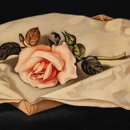During Hispanic Heritage Month, I met with Anthropology Professor Nadia Marin-Guadarrama to learn about her Mexican Cultures course. Dr. Marin-Guadarrama shared with me that one of the delights of the class is the diversity of her students: both those of Mexican origin or others who are curious about the history and the culture are enrolled during each iteration of the course, and often times the professor can learn just as much about her students’ experiences as they can from hers. During our conversation, she emphasized that there is not one singular Mexican identity, but many diverse indigenous identities with diverse cultural practices. In the course, Dr. Marin-Guadarrama intends to bring different aspects of Mexican community to her class through music, dance, and food. Because dance creates a sentiment of belonging, she was able to organize a Festival of Music and Dance with her students to honor Mexican dance traditions such as Son de Artesa, Concheros, and Xantoto. “We eat nostalgia here,” said Dr. Marin-Guadarrama, explaining how food is a core representation of art and kinship in Mexican communities. Mexico is a culture of corn, and in teaching through good, the professor makes authentic tortillas and tamales with her students.
In addition to sharing culture through art, Dr. Marin-Guadarrama emphasized the importance of teaching indigenous history in the class. During and after colonization, many indigenous languages were lost in a form of cultural genocide—colonization had a similar effect on Mexico and Latin American territories as it did on places like the United States and Africa where no indigenous community is spared from the violence. Her Mexican Cultures course attempts to highlight and romanticize indigenous cultures that have been lost. She paid close attention to the gender dynamics in indigenous communities, which was relatively egalitarian, in opposition to the colonial rule’s imposition of the patriarchal family and economic system in which women became property of their fathers and husbands. The colonial powers wanted the authority to decide how families should be organized, how culture should be incorporated in religion, and what was acceptable in education and in the government. Dr. Marin-Guadarrama also spoke on the topic of Black communities in Latin America. The Atlantic Slave Trade moved entire Black communities from Africa to Mexico where many individuals were exploited for their labor, contributing to a near-erasure of their African indigenous history. Thus, Black communities are not always easily recognized or appreciated within a broader Latin American culture. Dr. Marin-Guadarrama aims to educate her students about erased identities in the Mexican diaspora through various creative and research-based projects.
Dr. Marin-Guadarrama closed our interview with her final sentiments on the course: “As someone who is Mexicana, for me to have the experience to teach my own culture in a foreign country to students who are both like and unlike me is the ultimate happiness.”


